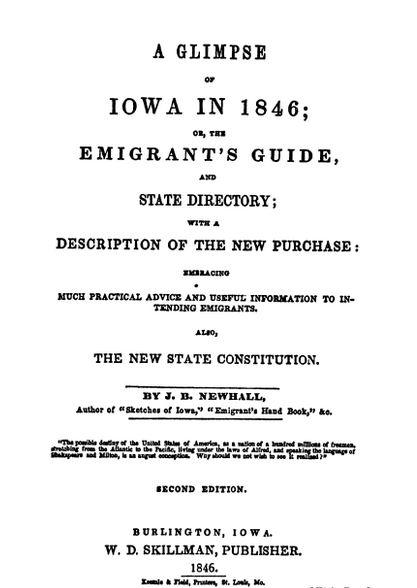Posted by Anne M on Wednesday, May 25, 2016
 What was Iowa City like 170 years ago? To get an idea, we can turn to John B. Newhall, author of A Glimpse of Iowa in 1846*. In this work, he states that one couldn’t help but think of Saint-Omer in France and he “speaks as an eye-witness.” I do not believe Newhall in this. He was a noted salesman in his day and his product was Iowa. He wrote a number of books and he lectured both on the east coast and in England proclaiming the wonders of the new state (or territory depending on the publication date of the book).
What was Iowa City like 170 years ago? To get an idea, we can turn to John B. Newhall, author of A Glimpse of Iowa in 1846*. In this work, he states that one couldn’t help but think of Saint-Omer in France and he “speaks as an eye-witness.” I do not believe Newhall in this. He was a noted salesman in his day and his product was Iowa. He wrote a number of books and he lectured both on the east coast and in England proclaiming the wonders of the new state (or territory depending on the publication date of the book).
Despite what Iowa diarist T.S. Parvin calls “too flowery” of language, Newhall is extremely useful in providing a directory for the city in 1846. He lists sellers of dry goods, doctors, mills, schools, churches, and newspapers. For our purposes, Iowa City had two coffee houses, one owned by Charles Frink and the other by R. C. Keathy. Lawyers included G. Folsom, M. Reno, and W. Penn Clark. There was one insurance company.
Aside from the local snapshot, Newhall’s book is pretty interesting in how he talks up Iowa. Every county is “picturesque,” “healthy,” and “fertile.” They are all abundant in timber, minerals, and fresh water. The farm yields of every crop would “astonish a New Englander.” For those less persuaded by practical arguments and more moved by glory, Newhall states “history never presented a spectacle half so sublime as the long train of moving emigrants, going forth to consecrate the pathless prairie to freedom and a lofty civilization.” Not even the armies of Caesar, Alexander, or Napoleon would compare.
Writing this book proved a hardship for Newhall. In the introduction to the State Historical Society reprint, William J. Petersen writes that the first edition had a small printing due to a lack of paper in Iowa. (Abundance for farmers and miners—not so much for writers). Newhall also had to remove information on Davenport, Keosauqua, Mount Pleasant, and Fairfield because of the paper shortage. One interesting connection: He was the main speaker at the celebration to welcome the first steamboat, the Ripple, to Iowa City, Remember our friend, Chauncey Swan, who presided over the festivities of that day!
Interested in more Iowa City history? Check out ICPL’s collection of history books at 977.7 or our Iowa Reference collection next to the Information Desk on the second floor.
* I would like to note that the full title of this work is “A Glimpse of Iowa in 1846; or, the Emigrant’s Guide, and State Directory with a Description of the New Purchase; Embracing Much Practical Advice and Useful Information to Intending Emigrants. Also, The New State Constitution.” But I would also like to add that this follows the title: “by J. B. Newhall, Author of “Sketches of Iowa,” “Emigrant’s Hand Book,” &c.” I’m not done—this is also on the title page “The possible destiny of the United States of America, as a nation of a hundred millions of freeman, stretching from the Atlantic to the Pacific, living under the laws of Alfred, and speaking the language of Shakespeare and Milton, is an august conception. Why should we not wish to see it realized?” Second Edition. And stop. (the quote is from Coleridge but not attributed).
All information cited from: Newhall, J. B. A Glimpse of Iowa in 1846. Cedar Rapids, Iowa: Torch Press, 1957. Rpt. of A Glimpse of Iowa in 1846. 1846.


So Big explores conflicting values, generational clashes, and living during an era of phenomenal social change. Ferber’s writing is clear and fresh, transcending many of the novels of the early twentieth century. If you enjoy Willa Cather, put So Big on your reading list. -Anne M